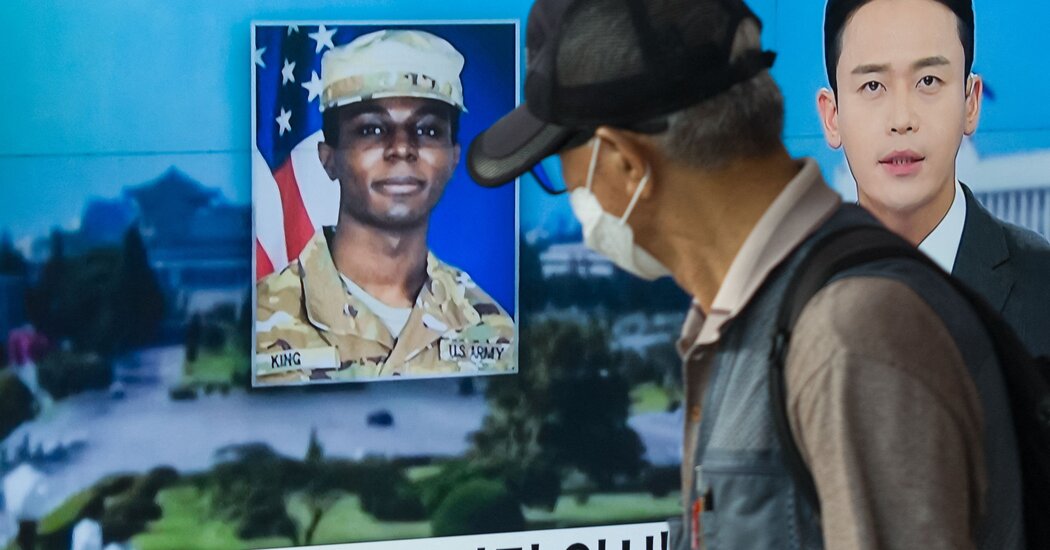HFO — under embargo. do not publishPvt. Travis T. King, the American soldier who crossed into North Korea on July 18, was released into U.S. custody o
HFO — under embargo. do not publish
Pvt. Travis T. King, the American soldier who crossed into North Korea on July 18, was released into U.S. custody on Wednesday following weeks of diplomacy mediated by the Swedish government, according to senior U.S. administration officials.
The officials, who spoke on condition of anonymity to describe the details of Private King’s release as he was in transit to a U.S. military base, said he would be reunited with his family in the United States and given physical and mental health support after being held by the North Koreans for 70 days.
His first stop after leaving North Korea was China, where U.S. officials were waiting for him. Private King then was put on a plane and flown to a U.S. military facility, though the officials declined identify it.
His release came after North Korean officials decided to expel Private King, saying that they had found him guilty of “illegally intruding” into their territory, according to the North’s official Korean Central News Agency. The news agency said that Private King had confessed to illegally entering North Korea because, it said, he “harbored ill feeling against inhuman maltreatment and racial discrimination within the U.S. Army and was disillusioned about the unequal U.S. society.”
A senior administration official said President Biden, who had been briefed on the efforts to secure Private King’s release, made no concessions to North Korea.
“The answer is simple: There were none. Full stop,” the official said.
Private King, 23, had been assigned to South Korea as a member of the First Brigade Combat Team, First Armored Division. After being released in July from a South Korean detention center where he had spent time on assault charges, he was escorted by U.S. military personnel to Incheon International Airport outside Seoul to board a plane to the United States, where he was expected to face additional disciplinary action.
He never boarded the plane. Instead, he fled to the North through the Demilitarized Zone, which separates North and South Korea, taking a bus the next day to the border village of Panmunjom, which lies inside the DMZ and allows tourists to visit
The soldier “willfully and without authorization crossed the Military Demarcation Line into the Democratic People’s Republic of Korea,” Colonel Taylor, the public affairs officer for U.S. Forces Korea, said at the time.
American officials offered few details of what they said was a “truly complex operation” to retrieve Private King from one of the world’s most isolated countries. They said the key was Sweden’s government, which serves as the “protecting power,” or diplomatic go-between, for the United States in North Korea.
Officials said the United States learned from Sweden several weeks ago that the North Koreans had decided to expel Private King in the near future. That kicked off a period of indirect, but intense, negotiations between the United States and North Korea, and direct discussions with China.
The result of those negotiations was the operation on Wednesday in which Swedish officials entered North Korea, took custody of Private King, and brought him into China. He was then flown to the U.S. military facility.
U.S. officials praised the Chinese government for its assistance in facilitating Private King’s departure from China, but insisted that China did not participate in mediating the talks with North Korea during the last several weeks.
The American officials declined to say why they believe North Korea decided to release Private King after a relatively short time.
Last month, North Korea said that Private King wanted to seek refuge in the isolated Communist country or in a third country. In its announcement on Wednesday, it did not elaborate on why it had decided not to grant his wish.
One U.S. administration official said it was clear on Wednesday that Private King was happy to be returning to the United States and had expressed a desire to be back with his family.
The U.S. officials declined to say what disciplinary action, if any, would be taken after Private King returned to the United States.
Private King was the first known American held in North Korean custody since Bruce Byron Lowrance was detained for a month after illegally entering the country from China in 2018.
Civilian Americans accused of illegal entry have been prosecuted and sentenced to hard labor, or sometimes released and expelled.
Robert Park, a Korean American missionary who walked across the border between China and North Korea in 2009, was held for 43 days in the North before being deported by plane to Beijing. In 2013, Merrill Newman, an American retiree, was held for 42 days before being flown from Pyongyang, the North Korean capital, to Beijing.
In the cases of some civilian Americans accused of illegal entry, North Korea has also used them as bargaining chips in negotiations with Washington, with which it has no formal diplomatic ties.
www.nytimes.com

COMMENTS